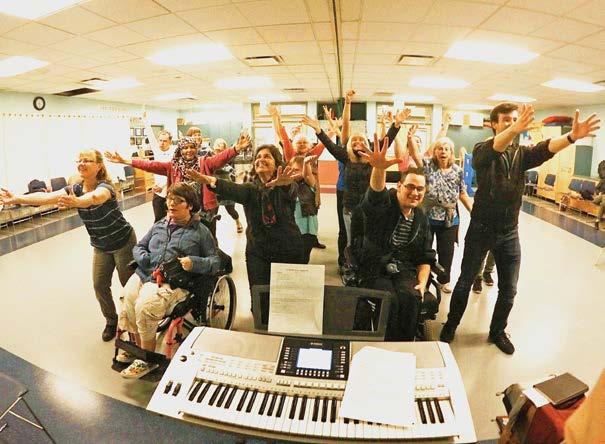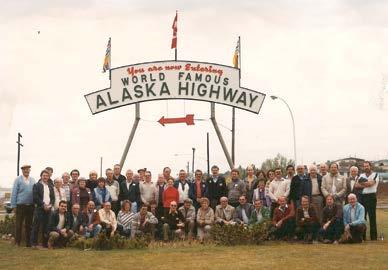
4 minute read
Communicating Through the Power of Music
Peter and Anne-Marie Brimacombe
Severely traumatized at a tender age, he withdrew from the world.
He would eat, sleep, and follow some direction, but for years no words passed his lips.
Words of encouragement from others and hugs of consolation failed to penetrate the solid armour he wore. Some closest to him began to lose hope of his ever returning to himself and to them.
Then one day, quite by chance, he heard a woman sing a song and his armour cracked. It was a song he’d experienced early in life in a
Photo taken before COVID-19.
joyful moment—before the trauma. His tears started to flow, followed by syllables and vowels then words. The long-awaited miracle occurred. He was coming back.
Many of us know inherently that there is great power in music. Those working in music therapy have the honour of seeing little miracles occur through music often, and even some major miracles on very special days. Music cannot “wake the dead,” but so often it can wake what has seemingly died within us.
We are musicians, not music therapists, but we understand that the power and effect of music in itself is miraculous. It can bypass the mind and go straight to the heart. The ways and means to communicate through music are exponential— perhaps infinite.
Each of its elements, including melody, harmony, rhythm, tempo, instrumentation, and dynamic expression, can be used in a multitude of ways. They can then be combined together in other myriad ways and styles, enabling us to
express and experience our whole range of emotions. Our greatest joy and our deepest sorrow can be expressed and then felt by others through music. No wonder Leo Tolstoy described music as “the shorthand of emotion.”
Added to all that is the opportunity to add words to the music as in song, enabling us to communicate powerfully and simultaneously to both the mind and the heart. Another Amazing Aspect of Music Its power to communicate is not limited to or bound by geography or time. Imagine a German musician in the 1820s, composing a beautiful melody, arranging it for a symphony to perform, and adding voices to sing words from a chosen poem, Ode to Joy.
Fast-forward to today, 2 centuries later. Live performances and recorded versions of Beethoven’s 9th Symphony continue to be cherished by music lovers all over the world. It has been adapted to almost every imaginable style of music: Search iTunes for “Joyful, Joyful,” the hip hop finale in the movie Sister Act II with Whoopi Goldberg.
Different types of music are effective in so many aspects of our lives, from inspiring action, to helping us to centre and heal. It is used to celebrate and commemorate almost every significant individual and community event in our lives—everywhere around the world. Described as the “universal language,” music can also foster understanding and unite people in spite of major differences.
We experience this first-hand in West Coast Reach Association. REACH! groups bring people together through music from such diverse groups in the community as new immigrants and refugees, those who are abled differently (aren’t we all?), members of the street community, and everyone else who’d like to participate.
We love how music can be oblivious to differences of colour, creed, ability, and economic standing, enabling all to experience and celebrate together what we hold in common.
Yet music also expresses and illustrates important differences. We each love different artists and different musical forms and styles. Our world is rich in the diversity of music stemming from many cultures and nationalities. What a great opportunity it affords us for sharing with each other, learning from each other, and for cross-pollination (sometimes in music called “crossover” or “fusion”).
We are fortunate to see in our REACH! programs, how people’s lives can be changed for the better through music. Their self-esteem and confidence grow as well as their respect and appreciation of others. Fast friendships are established among some of the seemingly most unlikely candidates. Through our performances, our groups then communicate a spirit of positivity to the greater community. Through our new virtual sessions and presentations, that reach is becoming international.
Bono, the Irish lead singer of the band U2, says, “Music can change the world, because it can change people.”
We agree. And, at a time when there is much doubt and uncertainty in the world, it can be especially relevant and important. s Peter and Anne-Marie Brimacombe are co-founders of West Coast Reach Association (REACH!), a registered Canadian charity in Victoria that celebrates diversity of ages, cultures, and abilities through music and the performing arts.
Recovery from mental illness is possible. You can help.
When your clients take the step of including Coast Mental Health Foundation in their Will, they help ensure that no matter what the landscape of mental health is like in 20 years, 30 years, and beyond, Coast will be here to respond, improve, and save lives, just as we have since 1972.
Your legacy will ensure people like Matt can recover from mental illness.
Coast Mental Health Foundation Registration Number: 86150 8018 RR0001
Learn how to leave a legacy gift to Coast Mental Health Foundation.
Contact Meghan Boswell 604.785.1910 | meghan.boswell@ coastmentalhealth.com
This collage was created by a 13-year-old participant in EFry’s JustKids program.










